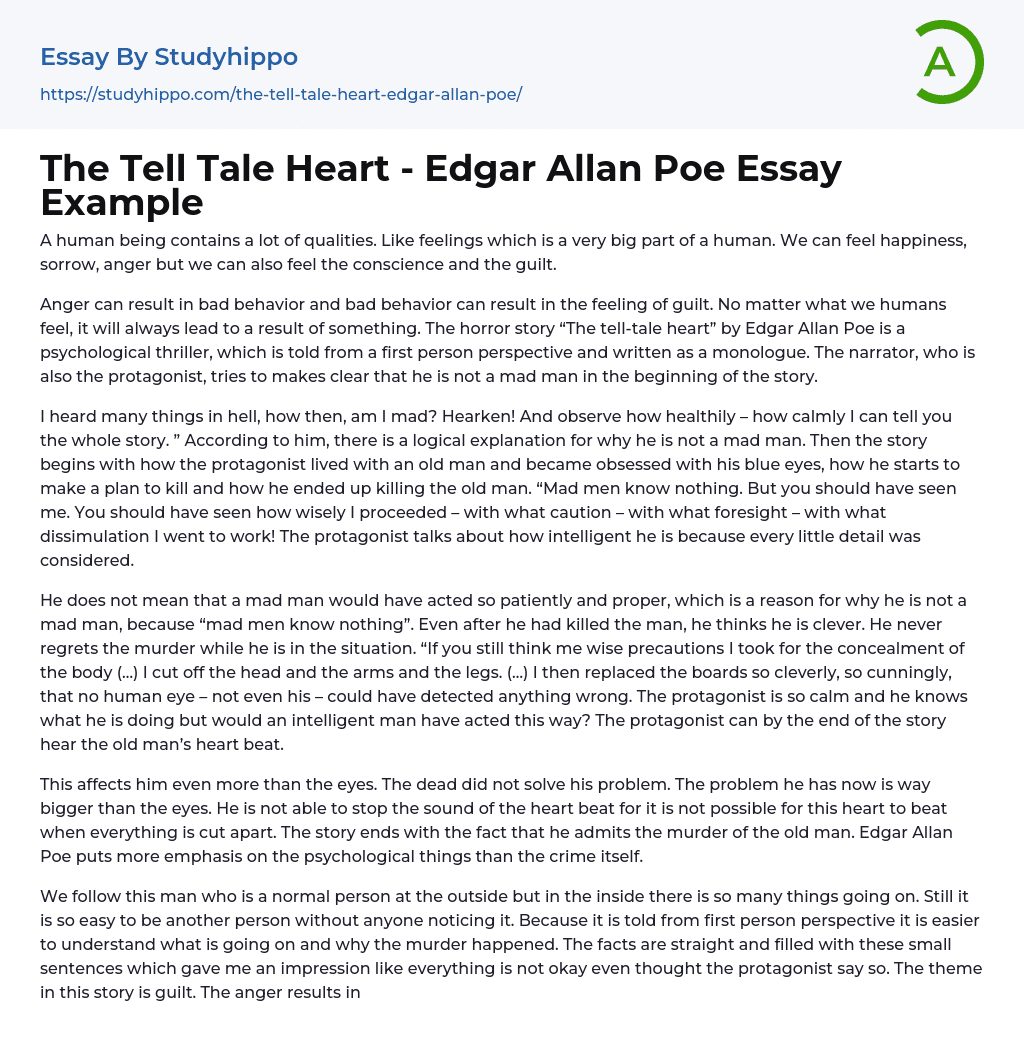A human being contains a lot of qualities. Like feelings which is a very big part of a human. We can feel happiness, sorrow, anger but we can also feel the conscience and the guilt.
Anger can result in bad behavior and bad behavior can result in the feeling of guilt. No matter what we humans feel, it will always lead to a result of something. The horror story “The tell-tale heart” by Edgar Allan Poe is a psychological thriller, which is told from a first person perspective and written as a monologue. The narrator, who is also the protagonist, tries to makes clear that he is not a mad man in the beginning of the story.
I heard many things in hell, how then, am I mad? Hearken! And observe how healthily – ho
...w calmly I can tell you the whole story. ” According to him, there is a logical explanation for why he is not a mad man. Then the story begins with how the protagonist lived with an old man and became obsessed with his blue eyes, how he starts to make a plan to kill and how he ended up killing the old man. “Mad men know nothing. But you should have seen me. You should have seen how wisely I proceeded – with what caution – with what foresight – with what dissimulation I went to work! The protagonist talks about how intelligent he is because every little detail was considered.
He does not mean that a mad man would have acted so patiently and proper, which is a reason for why he is not a mad man, because “mad men
know nothing”. Even after he had killed the man, he thinks he is clever. He never regrets the murder while he is in the situation. “If you still think me wise precautions I took for the concealment of the body (…) I cut off the head and the arms and the legs. (…) I then replaced the boards so cleverly, so cunningly, that no human eye – not even his – could have detected anything wrong. The protagonist is so calm and he knows what he is doing but would an intelligent man have acted this way? The protagonist can by the end of the story hear the old man’s heart beat.
This affects him even more than the eyes. The dead did not solve his problem. The problem he has now is way bigger than the eyes. He is not able to stop the sound of the heart beat for it is not possible for this heart to beat when everything is cut apart. The story ends with the fact that he admits the murder of the old man. Edgar Allan Poe puts more emphasis on the psychological things than the crime itself.
We follow this man who is a normal person at the outside but in the inside there is so many things going on. Still it is so easy to be another person without anyone noticing it. Because it is told from first person perspective it is easier to understand what is going on and why the murder happened. The facts are straight and filled with these small sentences which gave me an impression like everything is not okay even thought the protagonist
say so. The theme in this story is guilt. The anger results in a murder and the murder results in guilt.
According to me is the sound of the heart, the guilt in the subconscious.He does not mention that he regret this murder but the sound of this heart which is not there is the guilt eating him up inside. He does not mention that he regrets this murder, but the sound of the heart is eating him up inside. He cannot control it; he cannot do anything than admit the murder.
This man was filled with feelings like anger, hate, irritation etc. He knew that he had to do something to make these feelings and thoughts disappear, but even after he had done something it would not go away. As a human being he could not stand out the guilt. So he admitted the murder.
- Aldous Huxley essays
- Alice Walker essays
- Amy tan essays
- Anne Bradstreet essays
- Anton Chekhov essays
- Arthur Miller essays
- Augustine essays
- Bertolt Brecht essays
- Booker T Washington essays
- Carol ann duffy essays
- Charles Dickens essays
- Charlotte Perkins Gilman essays
- Chinua Achebe essays
- Christina Rossetti essays
- Consider The Lobster essays
- Edgar Allan Poe essays
- Elizabeth Bishop essays
- Emily Dickinson essays
- Ernest Hemingway essays
- F. Scott Fitzgerald essays
- George Orwell essays
- Harper Lee essays
- Homer essays
- James Baldwin essays
- Jane Austen essays
- John Donne essays
- John Steinbeck essays
- Kate Chopin essays
- Kurt Vonnegut essays
- Langston Hughes essays
- Leonardo Da Vinci essays
- Mark Twain essays
- Mary Shelley essays
- Maya Angelou essays
- Nathaniel Hawthorne essays
- Oscar Wilde essays
- Percy Bysshe Shelley essays
- Peter Skrzynecki essays
- Phillis Wheatley essays
- Poets essays
- Ralph Waldo Emerson essays
- Ray Bradbury essays
- Richard Rodriguez essays
- Robert Browning essays
- Robert Frost essays
- Robert Louis Stevenson essays
- Seamus Heaney essays
- Sherman Alexie essays
- Sophocles essays
- Stephen King essays




